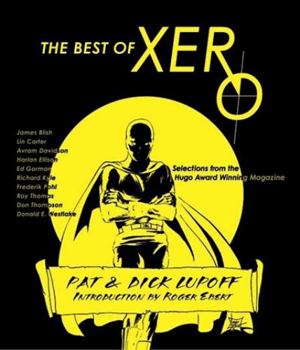The Best of Xero
Select Format
Select Condition 
Book Overview
From modest beginnings to the 1963 Hugo Award for Best Fanzine, Xero was a fascinating and controversial convergence of writers, artists, and a burgeoning fan community. Collected here from Pat & Dick Lupoff s legendary fanzine are an array of excellent essays, memoirs, and ongoing debates on science fiction, mysteries, comic books, and popular culture as well as the revolving letters of comment that are virtual forerunners of the Internet. Highlights of The Best of Xero include Harlan Ellison s prescient take on the movie Psycho, Donald Westlake s humorous denouncement of the science-fiction field, James Blish s nostalgic look back on his scriptwriting stint for the Captain Video serial, Lin Carter s spot-on parody of Sax Rohmer s Fu Manchu novels; and Don Thompson s detailed analysis of the origins of ultrapowerful and mysterious comic-book heroes Dr. Fate and The Spectre. The Best of Xero also features original comics and illustrations from Xero and an introduction by film critic and Xero contributor Roger Ebert.
Format:Hardcover
Language:English
ISBN:1892391112
ISBN13:9781892391117
Release Date:June 2004
Publisher:Tachyon Publications
Length:220 Pages
Weight:1.40 lbs.
Dimensions:1.0" x 7.0" x 8.8"
Customer Reviews
1 rating
This was fandom... (a glimpse)
Published by Thriftbooks.com User , 19 years ago
[I should state at the outset that I did not read evry word of this book.] Xero was a fanzine, a home-made magazine dedicated to the hobbies/literary passions of its editors -- in this case, science fiction, comic books, etc. This was true alternative press stuff, if you like, and the book should be purchased by many colleges and universities with library collections supportive of the history of same. The book appropriately suggests a pre-Internet kind of reader-writer engagement was going on. I'm reminded also of the "underground" press phenomenon that was to emerge a few years later. (Xero dates to 196-62.) For members of the small "communities" of often widely-separated science fiction and comics fans, fanzines arrived in mailboxes as letters from one's own country (of the imagination). Of course a lot of what went on was just chat. I found plenty in this book that was still of interest -- in fact, one piece of information that was very useful for an article I've just submitted. The publishers have wisely included a generous helping of letters of comments (LOCs) published in the lively pages of this classic early-Sixties fanzine. It would be good to see similar anthologies drawing on (say) the pages of Tolkien-related fanzines from years prior to and close to the first wave of mass popularity circa 1966.






